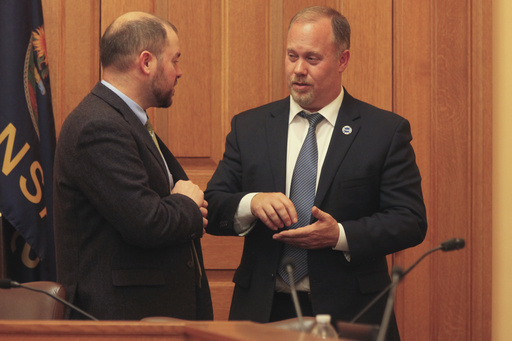TOPEKA, Kan. (AP) — Kansas legislators approved on Friday another year’s worth of funding for most state agencies and services after a few lawmakers staged a last-minute public protest over a 93% pay increase for themselves coming next year.
The Republican-controlled Senate approved, 26-12, a bill with about $19 billion in spending for the state’s 2025 budget year, which begins July 1. It covers most of the spending outside of aid to the state’s public schools, which is in a separate measure that has stalled.
The Senate’s action came hours after the GOP-controlled House approved the bill, 78-44, so the measure goes next to Democratic Gov. Laura Kelly. She’s likely to sign the bill, but the state constitution allows her to veto individual spending items, which she has done regularly in the past.
The bill would provide a 5% pay increase for all state government workers, plus larger increases for public safety workers and workers whose pay has lagged behind their counterparts in the private sector. But those increases are far short of the pay raise for lawmakers taking effect at the start of 2025 under a law enacted last year that didn’t require them to vote on the increase.
Critics of the pay raise managed to get the Senate to include in its version of the next state budget a provision delaying the pay raise at least another year. House and Senate negotiators didn’t include it in the final version of Friday’s spending bill, prompting opponents to complain about the gap between the 93% raise for lawmakers and the 5% raise for most state workers.
“People don’t trust politicians,” said Sen. Rob Olson, a Kansas City-area Republican. “This is why.”
Legislators planned to adjourn by early Saturday morning for a spring break and return April 25 for a final five days in session.
For three years, Kansas has been flush with revenues, and under the spending approved Friday, the state still would have more than $3.7 billion in excess funds at the end of June 2025.
Kelly and lawmakers want to cut taxes, but a compromise plan from her and GOP leaders failed Thursday. House and Senate negotiators drafted a new plan Friday evening to cut income, sales and property taxes by more than $1.5 billion over three years, but Kelly’s chief of staff, Will Lawrence, said it “far exceeds” what she deems affordable.
Legislators also haven’t approved a bill with $6 billion in spending for the K-12 public school system. The state’s 286 districts will see an increase in aid between $240 million and $320 million, or between 4.9% and 6.5%. However, disagreements over special education policies led the Senate to reject one bill Thursday, 12-26, forcing lawmakers to try to draft a new version.
The bill funding other parts of the budget included provisions from GOP senators aimed at forcing Kelly to provide help to Texas in its border security fight with the Biden administration and restrict diversity programs on college campuses.
House and Senate negotiators decided not to delay the legislative pay raise.
A bipartisan commission of mostly former legislators concluded last year that lawmakers are underpaid and that low pay keeps younger and less wealthy people and people of color out of the Legislature. The law creating the commission allowed the raise to take effect unless both chambers rejected it by early February, which they didn’t.
The increase will be nearly $28,000 a year for rank-and-file legislators, boosting their total compensation from $30,000 to nearly $58,000, including daily expense reimbursements in session. Legislative leaders get additional payments because of their duties, and the House speaker and Senate president will make more than $85,000 a year, up from $44,000.
During the House’s debate, Republican Rep. Chuck Smith, of southeastern Kansas, backed the pay raise by praising the work of the chairs of the House budget committee and a committee on K-12 spending.
“We ought to be thanking these people for what they do,” Smith said. “It’s unbelievable, the quality of people we have in here.”
The tone was far different in the Senate. Facing a barrage of questions from Olson and Sen. Dennis Pyle, a northeastern Kansas Republican, Billinger acknowledged that he doesn’t think the big pay raise is appropriate.
“Something’s very, very wrong,” Pyle said. “It’s a sad day for Kansas.”
Pay for lawmakers varies widely by state, according to National Conference of State Legislatures data. New Hampshire’s salary is $100 a year — the same as in 1889 — while New Mexico pays $202 to cover lawmakers’ expenses in session but no salary.
Alaska lawmakers’ salaries rose by 67% from $50,400 to $84,000 at the start of their annual session this year, and New Jersey legislators will see their pay increase in 2026, also by 67%, from $49,000 to $82,000. New York lawmakers received a 29% raise at the start of 2023, making their pay the highest in the nation at $142,000 a year.
This website uses cookies so that we can provide you with the best user experience possible. Cookie information is stored in your browser and performs functions such as recognising you when you return to our website and helping our team to understand which sections of the website you find most interesting and useful.
